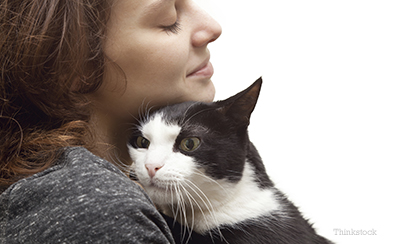
Dr. Ruth Macpete talks about cats and cancer -- what every pet parent should know.
While most people know that cancer is a leading cause of death in humans, many are unaware that cancer is also one of the leading causes of death in older cats. Like their human counterparts, cats can develop different types of cancers, such as mammary cancers, lymphoma, leukemia, and skin cancers to name a few. Another important point about cancer is that not all cancers are the same. Although some are resistant to treatment, many respond well to treatment. In fact, if detected early, cancer can often be more treatable than other geriatric diseases such as renal and cardiac disease. As is the case with many other diseases, earlier diagnosis and treatment can improve the prognosis.
So what can you do to lower your cat’s risk of dying from cancer? Fortunately there are a few steps you can take to improve your cat’s odds:
1. Spay your cat. Everyone should be spaying their cat to prevent overpopulation, but spaying has an additional cancer benefit many cat parents don’t realize. Spaying a cat before their first heat cycle lowers their risk of developing mammary adenocarcinoma by lowering estrogen levels that promote cancer cell growth.
2. Keep your cat indoor. Cats should be kept indoors for a variety of reasons. For starters, indoor cats typically outlive their outdoor counterparts. The average life span for an indoor cat ranges from 12-18 years, while the average life span for an outdoor cat is 4-5 years. However, besides protecting them from outdoor dangers, keeping your cat indoors and away from the sun also protects them against squamous cell carcinoma. This is especially true for white or lightly pigmented cats that are at an increased risk for getting squamous cell cancer on their ears, nose and eyelids. Keeping them indoors lowers their ultraviolet light exposure and helps protect them from this type of cancer.
3. See your veterinarian regularly. Insuring that your cat has regular veterinary exams is the best chance to detect cancer early. Screening examinations are important because they allow your vet to look for any “lumps and bumps,” and check for subtle signs of cancer or diseases. Remember earlier diagnosis and treatment can improve the prognosis for many cancers.
4. Vaccine risk. Have your veterinarian tailor your cat’s vaccines according to their particular exposure risk. There is no denying the fact that vaccines are important and they prevent many common deadly diseases. However a few vaccines have been associated with the development of a type of cancer called a sarcoma at the injection site. In order to lower your cat’s odds of getting vaccine-associated sarcomas, vaccinate them according to their needs and risks. Your veterinarian will help you determine which vaccines your cat should receive and how often based on their age and lifestyle.
5. Be your cat’s early detection sentinel. Look for any physical or behavioral changes in your feline friend and immediately report these changes to your veterinarian. Become familiar with the signs and symptoms of cancer. According to the American Veterinary Medical Association (AVMA) and The Veterinary Cancer Society (VCS) the ten most common signs and symptoms of cancer in pets:
- Abnormal swellings that persist or continue to grow
- Sores that do not heal
- Weight loss
- Loss of appetite
- Bleeding or discharge from any body opening
- Offensive odor
- Difficulty eating or swallowing
- Hesitation to exercise or loss of stamina
- Persistent lameness or stiffness
- Difficulty breathing, urinating, or defecating
And remember these are just some of the common signs and symptoms of cancer. This list is not comprehensive and these symptoms are not exclusive to cancer. If your cat has any of these symptoms or you have any concerns about their health, see your veterinarian as soon as possible. Although we don’t have the ability to predict cancer, we can take steps to lower your cat’s risk of getting cancer or increase their odds of early detection and treatment. If you want more information about cancer visit the Veterinary Cancer Society visit: www.vetcancersociety.org and don’t forget your veterinarian is your most powerful ally in the fight against diseases like cancer-talk to them!
If you have any questions or concerns, you should always visit or call your veterinarian – they are your best resource to ensure the health and well-being of your pets.
